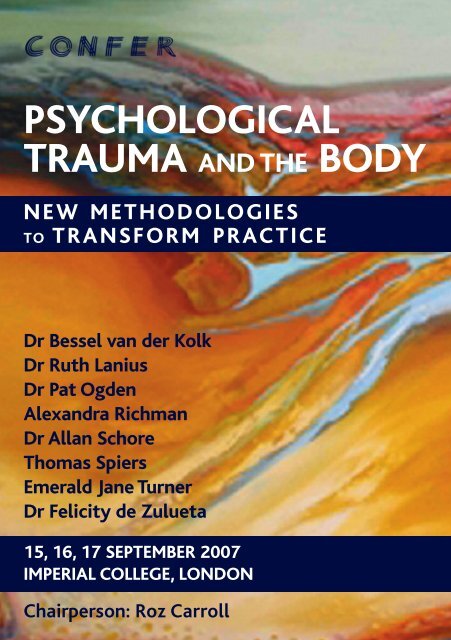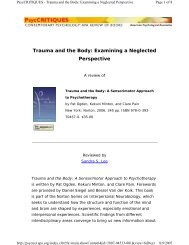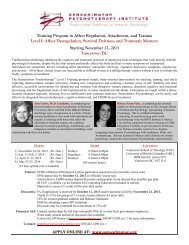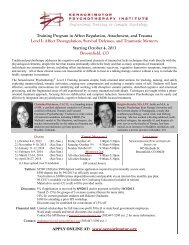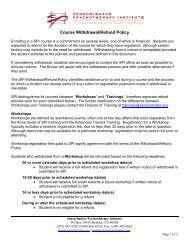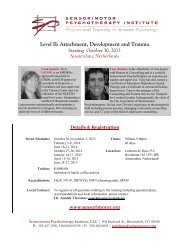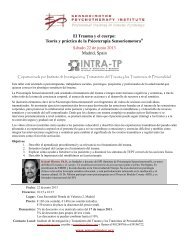psychological trauma body and the - Sensorimotor Psychotherapy ...
psychological trauma body and the - Sensorimotor Psychotherapy ...
psychological trauma body and the - Sensorimotor Psychotherapy ...
You also want an ePaper? Increase the reach of your titles
YUMPU automatically turns print PDFs into web optimized ePapers that Google loves.
PSYCHOLOGICAL<br />
TRAUMA AND THE BODY<br />
NEW METHODOLOGIES<br />
TO TRANSFORM PRACTICE<br />
Dr Bessel van der Kolk<br />
Dr Ruth Lanius<br />
Dr Pat Ogden<br />
Alex<strong>and</strong>ra Richman<br />
Dr Allan Schore<br />
Thomas Spiers<br />
Emerald Jane Turner<br />
Dr Felicity de Zulueta<br />
15, 16, 17 SEPTEMBER 2007<br />
IMPERIAL COLLEGE, LONDON<br />
Chairperson: Roz Carroll
PROGRAMME<br />
DAY 1 Saturday 15th September 2007<br />
9.30 Registration begins - Coffee, fruit <strong>and</strong> croissants on arrival<br />
10.15 Dr Pat Ogden<br />
Trauma <strong>and</strong> <strong>the</strong> Body:The Theory <strong>and</strong> Practice of <strong>Sensorimotor</strong> Psycho<strong>the</strong>rapy<br />
<strong>Sensorimotor</strong> Psycho<strong>the</strong>rapy integrates cognitive <strong>and</strong> somatic interventions in <strong>the</strong> treatment of<br />
<strong>trauma</strong>, emphasizing <strong>body</strong> awareness, practicing new actions <strong>and</strong> building somatic resources.This<br />
approach will be demonstrated through videotaped excerpts of sessions with clients so that <strong>the</strong><br />
audience can observe nuances of movement <strong>and</strong> watch how <strong>the</strong> <strong>body</strong> changes during <strong>the</strong>rapy<br />
with real-life issues. Key components of <strong>Sensorimotor</strong> Psycho<strong>the</strong>rapy will be illustrated:<br />
uncoupling <strong>trauma</strong>-based emotions from <strong>body</strong> sensations; promoting collaboration between<br />
client <strong>and</strong> <strong>the</strong>rapist; teaching mindfulness; building somatic resources; <strong>and</strong> developing a somatic<br />
sense of self. Since clients with complex <strong>trauma</strong> can be easily triggered by interventions that<br />
access <strong>the</strong> <strong>body</strong> too quickly, attention will be given to pacing, boundaries, <strong>and</strong> safe, gradual<br />
re-connection with <strong>the</strong> <strong>body</strong>. The videotapes show how to help clients discover <strong>and</strong> describe how<br />
past <strong>trauma</strong>tic experiences are affecting <strong>the</strong>ir current bodily experience--which in turn contributes<br />
to difficult emotions <strong>and</strong> beliefs--<strong>and</strong> also show how to integrate cognitive <strong>and</strong> somatic<br />
interventions to change <strong>the</strong> meaning of <strong>trauma</strong>tic event <strong>and</strong> regulate both emotions <strong>and</strong> arousal.<br />
<strong>Sensorimotor</strong> Psycho<strong>the</strong>rapy is conducted within a phase-oriented treatment approach <strong>and</strong> this<br />
presentation will address interventions for all three phases: stabilization <strong>and</strong> symptom reduction,<br />
work with <strong>trauma</strong>tic memory <strong>and</strong> re-integration.<br />
11.45 Coffee<br />
12.15 Dr Felicity de Zulueta<br />
“Resistance to change”: The embodiment of <strong>the</strong> <strong>trauma</strong>tic attachment in<br />
survivors of childhood abuse or neglect<br />
1.30 Lunch<br />
This presentation will outline <strong>the</strong> psychobiological effects of developmental <strong>trauma</strong> <strong>and</strong> present<br />
recent research on how to elicit <strong>the</strong> <strong>trauma</strong>tic attachment in adults using <strong>the</strong> Traumatic<br />
Attachment Induction Test. This will be followed by an outline of <strong>the</strong> <strong>the</strong>rapeutic implications of<br />
this test in <strong>the</strong> treatment of patients suffering from complex PTSD or developmental <strong>trauma</strong> using<br />
clinical vignettes to illustrate <strong>the</strong> work.<br />
14.30 Dr Ruth Lanius<br />
Psychological Trauma, Affective Experience, <strong>and</strong> <strong>the</strong> Self:<br />
Neurobiology <strong>and</strong> Treatment<br />
This presentation will address neuroscientific <strong>and</strong> clinical perspectives on emotion regulation in<br />
complex <strong>trauma</strong> disorders. The keynote will begin with a series of case discussions describing<br />
various forms of self-dysregulation in complex <strong>trauma</strong> disorders, followed by an overview of<br />
<strong>psychological</strong> processes <strong>and</strong> brain circuits implicated in emotion regulation, emotional<br />
awareness, <strong>and</strong> self-reflective functioning. The neural underpinnings of positive <strong>and</strong> negative
15.40 Tea<br />
emotional experiences <strong>and</strong> <strong>the</strong> brain circuitry thought to underlie different types of responses to<br />
<strong>trauma</strong>tic reminders will be described. Finally, Dr. Lanius will draw parallels between current<br />
neuroscience <strong>and</strong> traditional Buddhist psychology <strong>and</strong> mindfulness meditation, <strong>and</strong> discuss <strong>the</strong>ir<br />
relevance to PTSD <strong>and</strong> complex <strong>trauma</strong>.<br />
16.0 Dr Bessel van der Kolk<br />
The Psychobiology of Post Traumatic Stress<br />
Trauma can have profound effects on biological functioning. Inescapable <strong>trauma</strong>tic experiences<br />
cause alterations in psychophysiology, neuroendocrine responses, <strong>and</strong> immune function. Animal<br />
research, as well as <strong>the</strong> recently developed capacity to make detailed images of brain function,<br />
has allowed us to start underst<strong>and</strong>ing where <strong>and</strong> how <strong>trauma</strong> affects stress modulation <strong>and</strong><br />
repetition of <strong>trauma</strong>tic experiences. We will discuss <strong>the</strong> effects of <strong>trauma</strong> on <strong>the</strong> hypothalamicpituitary-adrenal<br />
axis, on <strong>the</strong> immune system, on health care utilization, <strong>and</strong> on attentional issues.<br />
This lecture also will explore <strong>the</strong> psychopharmacological approach to people with PTSD <strong>and</strong><br />
Dissociative Disorders. We will survey <strong>the</strong> various biological alterations that take place in <strong>the</strong><br />
human organism as a result of <strong>psychological</strong> <strong>trauma</strong>. We will explore how ordinary memories are<br />
stored, contrast this with <strong>the</strong> memory processing of <strong>trauma</strong>tic experiences, <strong>and</strong> how this leads to<br />
Post Traumatic Stress <strong>and</strong> Dissociative Disorders.<br />
17.15 End of Presentations<br />
17.30 Processing Sessions<br />
Please let us know if you would be interested in attending one of <strong>the</strong>se groups as a way of<br />
taking care of yourself at this event:<br />
• Yoga <strong>and</strong> relaxation<br />
• Processing group: reviewing <strong>the</strong> day with Emerald Jane Turner<br />
• Walking group: unwinding in Hyde Park with Roz Carroll<br />
18.30 Conference community supper - a chance to relax with colleagues<br />
DAY 2 Sunday 16th September 2007<br />
9.30 Registration begins - coffee, fruit <strong>and</strong> croissants on arrival<br />
10.15 Dr Pat Ogden <strong>and</strong> Dr Ruth Lanius<br />
Trauma, neuroscience, attachment <strong>and</strong> <strong>the</strong> <strong>body</strong>:<br />
Implications for clinical practice<br />
Bringing toge<strong>the</strong>r <strong>the</strong> art <strong>and</strong> science of <strong>trauma</strong> treatment, this workshop will present new advances<br />
in neuroimaging as well as demonstrate treatment approaches from <strong>Sensorimotor</strong> Psycho<strong>the</strong>rapy.<br />
The neuroimagining literature of <strong>trauma</strong>-related disorders <strong>and</strong> its clinical relevance will be discussed.<br />
This presentation includes examining flashback/reliving responses, as opposed to freezing <strong>and</strong>
11.45 Coffee<br />
hypoaroused responses, through neuroimaging of two cases with acute PTSD, <strong>and</strong> <strong>the</strong>n showing<br />
videotaped excerpts of sensorimotor psycho<strong>the</strong>rapy sessions with <strong>the</strong>se same cases. The interface<br />
between neuroimaging <strong>and</strong> clinical approaches will be explored, with an emphasis on <strong>the</strong> difference<br />
between treating hyperarousal <strong>and</strong> hypoarousal symptoms. Critical treatment issues such as<br />
emotion dysregulation, alexithymia, <strong>and</strong> attachment will be addressed through <strong>the</strong> examination of<br />
<strong>the</strong>se two case examples. This presentation will address interventions for all three phases of <strong>trauma</strong><br />
treatment: stabilization <strong>and</strong> symptom reduction, work with <strong>trauma</strong>tic memory, <strong>and</strong> re-integration.<br />
12.15 Emerald Jane Turner <strong>and</strong> Thomas Spiers<br />
Attending to <strong>the</strong> <strong>body</strong>: A somatic approach to <strong>trauma</strong> groups<br />
Immediately following <strong>the</strong> London bombings a large number of Underground workers were<br />
<strong>trauma</strong>tised <strong>and</strong> shocked. This presentation starts with a short case history of <strong>the</strong> development of a<br />
Somatic Group approach in response to this, <strong>and</strong> <strong>the</strong> process of intervention in light of Complex<br />
Responses Process <strong>the</strong>ory (Stacey). We will look at what it means to attend to <strong>the</strong> <strong>body</strong> within a<br />
group, with reference to <strong>the</strong> work of Levine, Ogden, <strong>and</strong> Rothschild, techniques that facilitate this <strong>and</strong><br />
<strong>the</strong> role of complexity in relation both to group work <strong>and</strong> organisational responses to <strong>trauma</strong>.<br />
13.30 Lunch<br />
14.30 Dr Allan Schore<br />
Attachment <strong>trauma</strong> <strong>and</strong> <strong>the</strong> developing right brain:<br />
origins of pathological dissociation<br />
Utilizing an interdisciplinary perspective Dr. Schore will offer a model of pathological dissociation,<br />
<strong>and</strong> <strong>the</strong>n apply <strong>the</strong> model to development, psycho-pathogenesis <strong>and</strong> particularly psycho<strong>the</strong>rapeutic<br />
treatment. He will suggest that early relational <strong>trauma</strong> alters <strong>the</strong> developmental trajectory of <strong>the</strong><br />
right brain, <strong>and</strong> that pathological dissociation represents a primitive strategy of right brain<br />
auto-regulation for coping with intense emotional arousal <strong>and</strong> pain. In <strong>the</strong> bulk of <strong>the</strong> lecture he<br />
will focus upon diagnostic <strong>and</strong> clinical matters, outlining a clinical approach based upon<br />
regulation dynamics for working with <strong>the</strong> disruption of subjectivity <strong>and</strong> inter-subjectivity that<br />
results from pathological dissociation.<br />
15.40 Tea<br />
16.0 Dr Allan Schore (Cont’d)<br />
17.15 End of formal presentations<br />
17.30 Processing Sessions<br />
• Yoga <strong>and</strong> relaxation<br />
• Processing group: reviewing <strong>the</strong> day with Emerald Jane Turner<br />
• Walking group: unwinding in Hyde Park with Roz Carroll<br />
18.30 Conference community supper
DAY 3<br />
Monday 17th September<br />
9.30 Registration begins - coffee, fruit <strong>and</strong> croissants on arrival<br />
10.15 Dr Bessel van der Kolk<br />
Self-regulatory changes following <strong>psychological</strong> <strong>trauma</strong> <strong>and</strong> <strong>the</strong> effects of<br />
successful treatment<br />
The human response to <strong>psychological</strong> <strong>trauma</strong> is one of <strong>the</strong> most important public health<br />
problems in <strong>the</strong> world. Traumatic events such as family <strong>and</strong> social violence, rapes <strong>and</strong> assaults,<br />
disasters, wars, accidents <strong>and</strong> predatory violence may temporarily or permanently alter <strong>the</strong><br />
organism's response to its environment. The imprints of <strong>the</strong> <strong>trauma</strong>tic experience consist of<br />
alterations in basic life regulatory mechanisms, disorganization of a host of psychosomatic<br />
functions, <strong>and</strong> of vague, over-general, fragmented, incomplete, <strong>and</strong> often disorganized personal<br />
narratives.<br />
Exposure to events that overwhelm <strong>the</strong> organism's coping mechanisms can damage <strong>the</strong><br />
self-regulatory systems necessary to restore <strong>the</strong> organism to its previous state. This involves<br />
a variety of "filtering" systems in <strong>the</strong> central nervous system that help distinguish relevant<br />
from irrelevant stimuli. These involve <strong>the</strong> biological systems involved in arousal modulation<br />
<strong>and</strong> attention: <strong>the</strong> sympa<strong>the</strong>tic <strong>and</strong> parasympa<strong>the</strong>tic nervous systems, heart rate variability, <strong>the</strong><br />
hypothalamic/pituitary/adrenal axis; various brain regions involved in information processing such<br />
as <strong>the</strong> amygdala, hippocampus, thalamus, anterior cingulate, medial frontal cortex, <strong>and</strong><br />
dorsolateral prefrontal cortex, <strong>and</strong> alterations in <strong>the</strong> immune response.<br />
With <strong>the</strong> help of videotaped interviews <strong>and</strong> <strong>the</strong> presentation of research outcome data this<br />
lecture will present <strong>the</strong> current status of knowledge regarding <strong>the</strong>se neurobiological alterations,<br />
<strong>and</strong> initial data on how effective <strong>the</strong>rapies for PTSD seem to be able to reverse some of <strong>the</strong>se<br />
changes. At <strong>the</strong> end of this lecture <strong>the</strong> audience will appreciate an array of subcortical functions<br />
disturbed by <strong>trauma</strong>tic experiences. In addition, <strong>the</strong> audience will have learned about a range of<br />
effective treatment approaches, <strong>and</strong> <strong>the</strong>ir effects on biological parameters.<br />
11.30 Coffee<br />
12.0 Alex<strong>and</strong>ra Richman<br />
EMDR <strong>and</strong> <strong>body</strong> processing<br />
EMDR (eye movement desensitization <strong>and</strong> reprocessing) is an active, multi-dimensional,<br />
empirically validated <strong>psychological</strong> treatment for resolving <strong>the</strong> emotional sequelae of <strong>trauma</strong>tic<br />
events <strong>and</strong> for treating anxiety-based disorders caused by <strong>trauma</strong>, both major as well as minor<br />
<strong>trauma</strong>tic events. EMDR is primarily a <strong>body</strong> oriented <strong>the</strong>rapeutic modality in that it assists those<br />
who have experienced a <strong>trauma</strong> <strong>and</strong> have lost <strong>the</strong> ability to physiologically modulate stress<br />
responses. During EMDR treatment <strong>the</strong> client attends to emotionally disturbing material in brief<br />
sequential doses while simultaneously focusing on an external stimulus <strong>and</strong> this assists <strong>the</strong> client<br />
to process often very disturbing bodily stored memory <strong>and</strong> sensations. These are people who have<br />
difficulty thinking <strong>and</strong> speaking <strong>and</strong> <strong>the</strong> treatment offers a method of processing disturbing<br />
material to a more autonomically regulated <strong>and</strong> adaptive state. The presentation will outline <strong>the</strong><br />
eight phases of EMDR treatment <strong>and</strong> examine how affect regulation is addressed in each phase<br />
of <strong>the</strong> EMDR protocol <strong>and</strong> will be illustrated with case material. Affect regulation techniques used<br />
during <strong>the</strong> preparation phase of EMDR will be demonstrated.
13.30 Lunch<br />
14.30 Dr Allan Schore<br />
Why <strong>the</strong> right brain is dominant in working with <strong>trauma</strong> <strong>and</strong> <strong>the</strong> <strong>body</strong><br />
Current experimental data from neuroscience <strong>and</strong> advances in <strong>the</strong> neurobiology of attachment<br />
emphasize <strong>the</strong> essential role of right brain processes in normal <strong>and</strong> abnormal functioning. A large<br />
<strong>body</strong> of very recent studies highlights <strong>the</strong> critical involvement of <strong>the</strong> right brain in attachment,<br />
unconscious processes, bodily-based states, <strong>trauma</strong>, negative affect <strong>and</strong> avoidance, pain, stress,<br />
dissociation, <strong>and</strong> affect regulation. The regulation model will be fur<strong>the</strong>r exp<strong>and</strong>ed to model working<br />
with dysregulation of both conscious <strong>and</strong> unconscious affects, <strong>and</strong> to emphasize right brain-to-right<br />
brain attachment mechanisms <strong>and</strong> intersubjective transference-countertransference dynamics in <strong>the</strong><br />
treatment of <strong>trauma</strong> <strong>and</strong> disorders associated with early attachment <strong>trauma</strong>.<br />
3.40 Tea<br />
16.0 Dr Allan Schore<br />
Why <strong>the</strong> right brain is dominant in working with <strong>trauma</strong> <strong>and</strong> <strong>the</strong> <strong>body</strong> –<br />
Implications for psycho<strong>the</strong>rapeautic practice<br />
17.30 Processing Sessions<br />
• Yoga <strong>and</strong> relaxation<br />
• Processing group: reviewing <strong>the</strong> day with Emerald Jane Turner<br />
• Walking group: unwinding in Hyde Park with Roz Carroll<br />
18.30 Conference community supper<br />
Speakers<br />
Dr. Ruth Lanius graduated from <strong>the</strong> University of British Columbia with a combined M.D. <strong>and</strong> Ph.D. degree in Neuroscience in<br />
1996. She continued her training at <strong>the</strong> University of Western Ontario where she completed her residency in psychiatry in 2000.<br />
She is an Associate Professor in <strong>the</strong> Department of Psychiatry at <strong>the</strong> University of Western Ontario. She established <strong>and</strong> directs<br />
<strong>the</strong> Traumatic Stress Service, a service that specializes in <strong>the</strong> treatment <strong>and</strong> research of Post<strong>trauma</strong>tic Stress Disorder (PTSD) <strong>and</strong><br />
related co-morbid disorders. Her research interests focus on studying <strong>the</strong> neural correlates of PTSD using neuroimaging<br />
(functional magnetic resonance imaging) <strong>and</strong> treatment outcome research examining various pharmacological <strong>and</strong><br />
psycho<strong>the</strong>rapeutic methods. Her research is currently funded by several federal funding agencies. Dr. Lanius is an ad hoc reviewer<br />
for numerous journals <strong>and</strong> granting agencies. She has lectured on <strong>the</strong> topic of PTSD in North America, Europe <strong>and</strong> Japan.<br />
Pat Ogden, Ph.D., has been a pioneer in somatic psychology <strong>and</strong> <strong>the</strong> treatment of <strong>trauma</strong> <strong>and</strong> developmental issues since <strong>the</strong><br />
late 1970s. Trained in a wide variety of somatic approaches, she is a Structural Integrator (Rolf Method) <strong>and</strong> a co-founder of <strong>the</strong><br />
Hakomi Institute. She has taught psychology at Naropa University in <strong>the</strong> Contemplative <strong>and</strong> Somatic psychology departments<br />
from 1985-2005. Dr Ogden is <strong>the</strong> founder <strong>and</strong> director of <strong>the</strong> Sensoimotor Psycho<strong>the</strong>rapy Institute <strong>and</strong> <strong>the</strong> first author of<br />
Trauma <strong>and</strong> <strong>the</strong> Body: A <strong>Sensorimotor</strong> Approach to Psycho<strong>the</strong>rapy (2006) published by W.W. Norton.<br />
Alex<strong>and</strong>ra Richman is a Clinical Psychologist specialising in <strong>the</strong> treatment of victims of acute <strong>trauma</strong> <strong>and</strong> personal injury, adult<br />
survivors of childhood abuse <strong>and</strong> dissociative disorders. In addition to conducting a private practice, Alex<strong>and</strong>ra is a Consultant<br />
Psychologist with <strong>the</strong> Traumatic Stress Service at <strong>the</strong> Maudsley Hospital in London, where she heads up an EMDR service within <strong>the</strong><br />
TSS. She is Past-President of <strong>the</strong> EMDR UK & Irel<strong>and</strong> Association, an Approved Consultant <strong>and</strong> Trainer in EMDR with <strong>the</strong> EMDR<br />
International Organisation (EMDRIA), as well as with EMDR Europe Association <strong>and</strong> her EMDR trainings are accredited by both<br />
<strong>the</strong>se organisations. Alex<strong>and</strong>ra has been a Facilitator with <strong>the</strong> EMDR Institute for 13 years <strong>and</strong> has assisted in many Institute<br />
trainings in several countries in Europe as well as <strong>the</strong> United Kingdom <strong>and</strong> Irel<strong>and</strong>.
Dr. Allan Schore is on <strong>the</strong> clinical faculty of <strong>the</strong> Department of Psychiatry <strong>and</strong> Biobehavioral Sciences, UCLA David Geffen<br />
School of Medicine, <strong>and</strong> at <strong>the</strong> UCLA Center for Culture, Brain, <strong>and</strong> development. He is author of three seminal volumes, Affect<br />
Regulation <strong>and</strong> <strong>the</strong> Origin of <strong>the</strong> Self, Affect Dysregulation <strong>and</strong> Disorders of <strong>the</strong> Self, <strong>and</strong> Affect Regulation <strong>and</strong> <strong>the</strong> Repair of <strong>the</strong><br />
Self, as well as numerous articles <strong>and</strong> chapters. His groundbreaking integration of neuroscience with attachment <strong>the</strong>ory has<br />
lead to his description as “<strong>the</strong> American Bowlby” <strong>and</strong> “<strong>the</strong> world's leading expert in neuropsychoanalysis.” Dr. Schore's activities<br />
as a clinician-scientist span from his <strong>the</strong>oretical work on <strong>the</strong> enduring impact of early <strong>trauma</strong> on brain development, to<br />
neuroimaging research on <strong>the</strong> neurobiology of attachment <strong>and</strong> studies of borderline personality disorder, to his biological<br />
studies of relational <strong>trauma</strong> in wild elephants, <strong>and</strong> to his practice of psycho<strong>the</strong>rapy over <strong>the</strong> last four decades. He leads Study<br />
Groups in Developmental Affective Neuroscience & Clinical Practice in Los Angeles, Berkeley, Portl<strong>and</strong>, Seattle, <strong>and</strong> Boulder,<br />
lectures internationally, <strong>and</strong> is a member of <strong>the</strong> Commission on Children at Risk for <strong>the</strong> Report on Children <strong>and</strong> Civil Society,<br />
“Hardwired to Connect.” “Allan Schore has become a heroic figure among many psycho<strong>the</strong>rapists for his massive reviews of<br />
neuroscience that center on <strong>the</strong> patient-<strong>the</strong>rapist relationship.” Daniel Goleman, author of Social Intelligence.<br />
Thom Spiers is <strong>the</strong> editor of <strong>the</strong> widely-read Trauma: A Practitioner's Guide for Counsellors (Routledge). He is <strong>the</strong> manager<br />
for DuPont's employee assistance programs in Europe <strong>and</strong> Asia, <strong>and</strong> was formerly head of counselling at London<br />
Underground. By background, Thom is a psycho<strong>the</strong>rapist whose practice draws heavily on his training in sensor motor<br />
psycho<strong>the</strong>rapy. He is currently completing a doctorate in Organisational Change Management. His singular integration of<br />
<strong>body</strong>-centred psycho<strong>the</strong>rapy, organisational <strong>the</strong>ory <strong>and</strong> practical experience with multiple cultures continues to shape his<br />
work, writing, <strong>and</strong> on-going development.<br />
Emerald-Jane Turner began her professional life as an Occupational Therapist, stimulating a life-long interest in a <strong>body</strong>centred<br />
approach to well being. She <strong>the</strong>n became proficient in <strong>body</strong>-centered psycho<strong>the</strong>rapy studying first at <strong>the</strong> Karuna<br />
Institute <strong>and</strong> <strong>the</strong>n at <strong>the</strong> Hakomi Institute. Eventually she specialized in <strong>the</strong> field of <strong>trauma</strong>. She has headed departments<br />
in <strong>the</strong> National Health Service, been an external supervisor for <strong>the</strong> Counselling <strong>and</strong> Trauma service at London<br />
Underground, trained psycho<strong>the</strong>rapists in Europe <strong>and</strong> South Africa <strong>and</strong> has contributed to Trauma: A Practitioner's Guide<br />
for Counsellors (Routledge). In <strong>the</strong> immediate aftermath of <strong>the</strong> July 2005 London terrorist bombings, Emerald-Jane was<br />
instrumental in supporting <strong>the</strong> recovery of London Underground staff. She also designs <strong>and</strong> facilitates corporate programs<br />
for maintaining resilience in <strong>the</strong> face of stress <strong>and</strong> <strong>trauma</strong>.<br />
Bessel van der Kolk, M.D. is <strong>the</strong> Medical Director of The Trauma Centre at <strong>the</strong> Justice Resource Centre in Boston, USA. He<br />
has been active as a clinician, researcher <strong>and</strong> teacher in <strong>the</strong> area of post<strong>trauma</strong>tic stress <strong>and</strong> related phenomena since <strong>the</strong><br />
1970s. His work integrates developmental, biological, psychodynamic <strong>and</strong> interpersonal aspects of <strong>the</strong> impact of <strong>trauma</strong><br />
<strong>and</strong> its treatment. His book Psychological Trauma was <strong>the</strong> first integrative text on <strong>the</strong> subject, painting <strong>the</strong> far ranging<br />
impact of <strong>trauma</strong> on <strong>the</strong> entire person <strong>and</strong> <strong>the</strong> range of <strong>the</strong>rapeutic issues which need to be addressed for recovery. Dr.<br />
van der Kolk <strong>and</strong> his various collaborators have published extensively on <strong>the</strong> impact of <strong>trauma</strong> on development, such as<br />
dissociative problems, borderline personality <strong>and</strong> self-mutilation, cognitive development in <strong>trauma</strong>tized children <strong>and</strong><br />
adults, <strong>and</strong> <strong>the</strong> psychobiology of <strong>trauma</strong>. He was co-principal investigator of <strong>the</strong> DSM IV Field Trials for Post Traumatic<br />
Stress Disorder. His current research is on how <strong>trauma</strong> affects memory processes <strong>and</strong> brain imaging studies of PTSD. Dr.<br />
van der Kolk is past President of <strong>the</strong> International Society for Traumatic Stress Studies, Professor of Psychiatry at Boston<br />
University Medical School, Co-Director of <strong>the</strong> National Child Traumatic Stress Network Community Practice Site <strong>and</strong><br />
Medical Director of <strong>the</strong> Trauma Center at HRI Hospital in Brookline, Massachusetts. He has taught at universities <strong>and</strong><br />
hospitals across <strong>the</strong> United States <strong>and</strong> around <strong>the</strong> world, including Europe, Africa, Russia, Australia, Israel, <strong>and</strong> China. His<br />
latest book, co-edited with Alex<strong>and</strong>er McFarlane <strong>and</strong> Lars Weisaeth, explores what we have learned in <strong>the</strong> past twenty<br />
years of <strong>the</strong> re-discovery of <strong>the</strong> role of <strong>trauma</strong> in psychiatric illness. Traumatic Stress: The Effects of Overwhelming<br />
Experience on Mind, Body, <strong>and</strong> Society was published by Guilford Press in May, 1996.<br />
Dr Felicity de Zulueta is a Consultant Psychiatrist <strong>and</strong> lead clinician of <strong>the</strong> Traumatic Stress Service at <strong>the</strong> Maudsley<br />
Hospital. She is also Honorary Senior Lecturer at King’s College London, a Group Analyst, Systemic Therapist <strong>and</strong><br />
Psychoanalytic Psycho<strong>the</strong>rapist. She is Founder member of <strong>the</strong> International Attachment Network <strong>and</strong> author of<br />
numerous papers <strong>and</strong> lectures on Attachment, PTSD <strong>and</strong> <strong>the</strong> origins of violence. She outlined <strong>the</strong> case for PTSD as an<br />
attachment disorder in her book From Pain to Violence, <strong>the</strong> <strong>trauma</strong>tic origins of destructiveness published in 1993. An<br />
updated 2nd edition is to be published in March 2006 by Wiley <strong>and</strong> Son. She also has a degree in biology <strong>and</strong> is<br />
interested in <strong>the</strong> study of bilingualism <strong>and</strong> cross cultural psychology <strong>and</strong> psychiatry.
Booking form<br />
Information<br />
Name<br />
Address<br />
Telephone Number<br />
Postcode<br />
Venue: Mechanical Engineering Building, Imperial<br />
College, Exhibition Road, London SW7<br />
Map: www.imperial.ac.uk/images/mappdfs/sk-map.pdf<br />
Dates: Saturday 15,<br />
Sunday 16 <strong>and</strong><br />
Monday 17 September 2007<br />
Times: Registration from 9.30<br />
Start 10.15<br />
Email<br />
Occupation<br />
I am self funded:<br />
I am organisationally funded:<br />
I am booking for <strong>the</strong> following conference days<br />
Saturday 15 Sept<br />
Sunday 16 Sept<br />
Monday 17 Sept<br />
I am interested in attending one of <strong>the</strong> following groups<br />
after <strong>the</strong> academic presentations: (subject to dem<strong>and</strong>)<br />
Yoga <strong>and</strong> relaxation<br />
Processing group: reviewing <strong>the</strong> day<br />
Walking group (unwinding in Hyde Park)<br />
Community supper (£15 extra)<br />
Dietary restrictions __________________________________<br />
Invoicing<br />
If you need to be invoiced for your place please give <strong>the</strong><br />
name of <strong>the</strong> person to be invoiced, organisation <strong>and</strong> full<br />
address plus a purchase order number if applicable.<br />
(please attach) A £20 admin fee is applied.<br />
Calculate your fee using <strong>the</strong> table on information page<br />
I enclose a cheque<br />
made payable to Confer Ltd for £ ____________________<br />
OR I would like to pay by credit card<br />
Please deduct £___________________ from card number<br />
Master Card Visa Switch<br />
Expiry date ____/____ Issue number _______ (Switch only)<br />
I would like to book an exhibition space for<br />
(name of organisation)__________________________________<br />
Please return with payment to:<br />
Confer, 36a Mildmay Road, London N1 4NG<br />
Fees (including lunch <strong>and</strong> VAT):<br />
Self-funded<br />
1 day only £150<br />
2 days £250<br />
All 3 days £350<br />
Organisationally funded<br />
1 day only £200<br />
2 days £360<br />
All 3 days £550<br />
Refreshments: A vegetarian lunch is included.<br />
A conference community supper will be served each<br />
evening for an additional £15 (subject to dem<strong>and</strong>).<br />
Exhibition Space: If you would like an exhibition space<br />
at <strong>the</strong> conference for your project, organisation or work,<br />
this please let us know: £117.50 per stall per day.<br />
Tube: South Kensington - Exhibition Road exit.<br />
Environmental Policy<br />
Full details at www.confer.uk.com<br />
The carbon emissions resulting from this conference will<br />
be offset by Confer.<br />
Coming by public transport?<br />
To encourage participants to come by public transport<br />
we will be raffling a new bike at <strong>the</strong> event.<br />
To enter <strong>the</strong> draw, show your public transport tickets at<br />
our registration table.<br />
Contact Confer: info@confer.uk.com<br />
Tel: 01728 689090 www.confer.uk.com<br />
Director of Confer:<br />
Jane Ryan<br />
Academic Consultant: Brett Kahr<br />
Project Consultants: Dr Liz Hall <strong>and</strong> Dr Allan Schore<br />
Programme Developer: Trish McEntee<br />
Organisational Development: Richard Hawkes<br />
Design: Gilbert Courbanally<br />
Thanks to Astrid Dahl for her kind permission to<br />
reproduce a detail of her painting.<br />
Confer Ltd Company No: 4962966 VAT Reg: 823594025<br />
Confer 36a Mildmay Road, London N1 4NG


